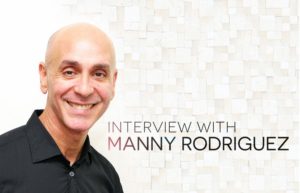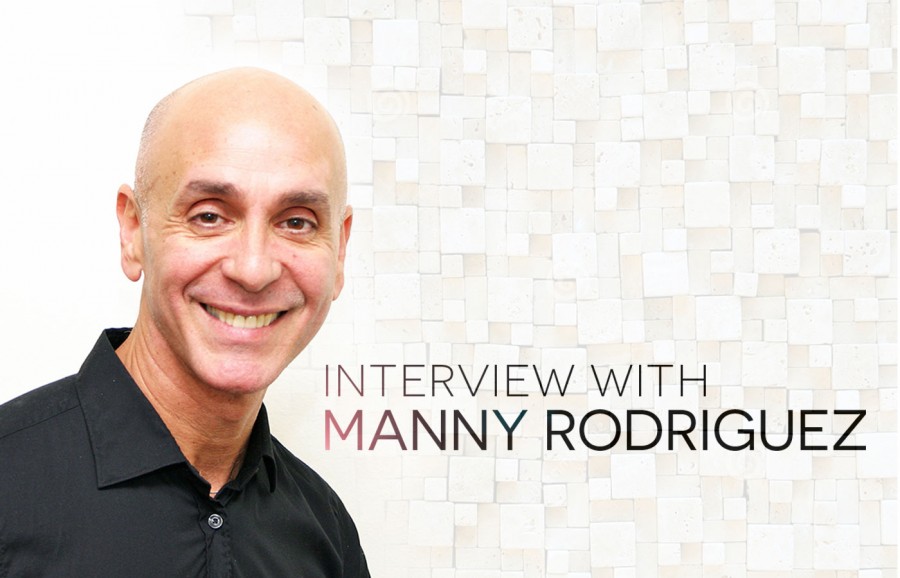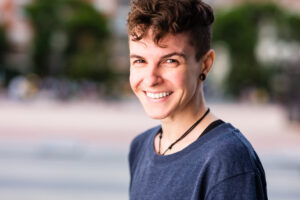La Fuente With Manny Rodriguez July 21, 2014 by Martha Lockie  I took at trip into the heart of Hollywood last week to meet Manny Rodriguez, Executive Director and Founder of La Fuente Hollywood Treatment Center. Manny has created a recovery gem tucked away in the midst of the hustle and bustle of the city. He has established a community-centered facility dedicated to the primary treatment of drug and alcohol addiction for men of all ages. I sat down with Manny Rodriguez to discover what he’s passionate about, the meaning of community to La Fuente and where his favorite place to eat in L.A. is. Here’s how it went: So tell me, how are people finding out about La Fuente? Who is your demographic? At this point we are all referral. We’ve been in the community since 2005 – so we had our roots planted in Hollywood in the sober community as a sober living. When we made the transition (to primary treatment) we already had a built in audience – for lack of a better word. I’ve also been sober for 20 years and so my relations in the immediate community, with therapists, interventionists and local hospitals has helped. What we do is community driven and that’s where our greatest opportunity to help people is, right here in our own backyard. That’s where I put most of my efforts, right here on the street where I live, 3 boulevards up and 3 boulevards down. What type of man comes to La Fuente? The population that is drawn to us are: a). men who want to get better and trust La Fuente to shepherd their treatment as well as those who have a dream to do something here and want to stay after treatment, b). they already live in Hollywood and don’t want to leave for treatment to then have to return and form a new community. This is unique – not because we are the only facility that does this but because we are the only facility in this neighborhood that does this. So we treat them, deal with the acute symptoms of craving and withdrawal and when we get past that we begin integrating them into the community they already lived in – but through new relationships. So, it’s anyone who wants/needs treatment, believes in what we are doing and want to be in this vibrant City. How do you incorporate the body, mind and spirit aspect of your program? La Fuente’s approach to treatment is integrated: clinical, fitness, nutrition and spiritual are all components during a client’s 90-day stay at La Fuente. What is applied works as an integrated approach to treatment, the clinical piece is crucial in the initial stage. Individuals who end up in treatment probably need more than a 12-step meeting. There’s something else below the surface and or they’ve used addictive substances to the degree that they need medical intervention. La Fuente’s clinical staff is led by a psychiatrist and an internal medicine doctor, both are Board Certified in Addiction Medicine. Our clinicians are also either Licensed Clinical Social Workers or Licensed Marriage and Family Therapists. Sometimes individuals coming into treatment need detoxification, La Fuente is licensed for detox. When a detox is necessary, medication is a part of getting clients past that first critical withdrawal period. When an individual has completed detoxification treatment and is stable, he is integrated into the daily treatment curriculum. Our clients are taken to the gym everyday and are taught the importance of physical exercise. How working out – not tying to become Mr. Muscleman – but simply getting on the treadmill or going for a hike in Griffith park can be really beneficial especially because they have depleted so much of their dopamine. Our nutritional piece is focused on real food; fresh fruits, vegetables, grains, protein, and yes, food that tastes good because you want them to like what they are eating. We keep very little sweets around the facility. All of this is how we work on getting the body back in working condition. The mind and spirit are areas that can be addressed after the physical state of the individual has improved. The mind and spirit also can take longer to develop and or get connected with so that a life free from drugs and alcohol is possible. That’s why we believe in the 90-day model and sometimes even 90-days is not enough for some individuals. A client will always feel physically better first and say, “I feel better, I got this. I don’t need to be here anymore.” However, emotionally we know they are not prepared to deal with the thought patterns that can trigger a relapse. The longer we can keep an individual engaged in treatment or extended care, the greater chance we have at improving their mind and spirit. La Fuente is 12-step based and our clients go to a 12-step meeting every night. This doesn’t work for everyone. Sometimes someone will say, “AA doesn’t work for me. NA doesn’t work for me. CA doesn’t work for me.” We never fight with anyone. Our approach is, “OK, let’s find something that does work for you.” And because we are client centered, client driven and we do individualized care, when that happens, we work with them on finding a solution that will give them some peace of mind, so that they are able to turn inward and find out how they are going to live a life that’s clean and sober with some kind of spiritual guidance. But we are 12-step based and I’m a big believer in it. The mind and spirit are an ongoing area for growth and expansion. Do you believe there are experimental drug users who are put in rehab prematurely? Yes, I do. However, we don’t take them. Anybody who is referred to us, are men who, while they understand the adverse consequences to their use and to their dependence, they continue to use drugs and alcohol. Yes, some people are put into treatment prematurely but I don’t think it’s a bad thing. When someone continues to feed the habit, eventually they’re going to need treatment. So perhaps premature admission into a program might actually save their life. What’s you opinion of facilities that advertise success rates? Good for them! Do you think the bells and whistles are important in treatment? No. How do you deal with a parent, wife, girlfriend, boyfriend or loved one of an addict who is using and shows up wanting to visit your client? We have a family program. It’s one of my favorite things to participate in. I love treating the family just as much as I love treating clients. If a loved one shows up under the influence, intoxicated, etc.: a). I would involve my clinical team in a way where we could intervene so the person who is under the influence doesn’t feel hurt, shamed, rejected or unimportant as a result of where they are, and not being able to participate at this point. b). I would also involve the client so that they understand what’s happening and they’re on board with our decision about the family member or loved one not being able to participate. Participating under the influence would not be a very healthy experience. How has your personal recovery shaped you in the business of recovery? It’s shaped me the same as if I were in any other business. I want to have integrity. I want to believe that I’m doing good work. I want to believe that I’m always trying to improve and that what I do makes a difference to some degree – in my life and in the lives of the people that I touch. I think that’s probably the way I’ve approached all the things I’ve done in my sobriety. It can be tricky to remain ethical in the business of recovery. It might appear that there’s big money to be made and that’s attractive to some, so it’s vital to look at the big picture. My life without integrity would be really short lived. No one would be helped if I make a decision based solely on gain; no one is helped including me. How has your dance training impacted the way you work your own program? Thank you so much for asking that question. I never thought that my former life as an artist, as a dancer had any relevance to what I do today. And for years I never included it in my bio, I never thought it mattered and I went to an impressive school (Juilliard in NYC). I did great things and my addiction stole all of it from me. During my formative years, the thing that I cultivated being a young artist, aspiring dancer and creative being was discipline. I had to be very disciplined. When I was a sophomore in high school and I received my first scholarship to a conservatory I would have to leave school at 11:30am. My responsibility was to get downtown, get on the bus, get to the studio, take my class, rehearse, get back on the bus, do my homework, and go back home. I learned sacrifice and discipline. But it was a double-edged sword – because of my addiction – I played with it. When I got sober, I still had those traits; I had just lost them for a while. I really have a passion for what I do and without discipline and self-sacrifice I can’t accomplish anything. Addiction is Nobody’s Fault, and Everybody’s Problem – I love this – tell me why it’s everybody’s problem. Everyone on this planet is affected by addiction. My neighbor may not know that I am an addict in recovery but he’s affected by it – he may not know it – but he is – in a positive way. Everyone is affected by the problem because it’s an epidemic, it spills over into everything including, families, friends, employers and the communities that have to deal with it. To a certain degree it’s not the person’s fault whose out on the street talking to himself, he doesn’t want to be on the street but he is. Addiction is a global epidemic. What defines La Fuente’s community support? It’s ongoing. We receive internal support form the community; they refer to us, come to our meetings, they come to our events, they send nice letters, they pat us on the back and say, “Hey, you’re doing a nice job.” We’re receiving support. Where we are giving support to the community is when we open our doors up to a 12-step meeting or open our facility to host a fundraiser. Whether it’s for CMLA or AA, they need to use the space and the space is available. So, we’re in support of the community. Additionally, if and when we can, we will scholarship treatment. Last year we gave a lot of financial help for treatment. We want to be able to do more of that. It’s a give and take. I really believe it has to be reciprocal. What sets La Fuente apart from other recovery communities in Los Angeles? I believe that anybody who works in this field has something special to offer. What makes us unique is where we do it and why we do it. What we do in terms of the curriculum, in terms of the delivery of services, I think we do an amazing job. Receiving our CARF accreditation was a real exercise in taking action and rising to the occasion, saying, “We want to be better.” What we do is special because of the people who receive it, they have the opportunity to get better and we help to facilitate that. We’re not the only people who do that. What makes us unique is that it happens in Hollywood. It happens in a real life environment. It’s not a remote location where no one can get to you. Right in the heart of Hollywood. Real life. Clients don’t feel like they’ve been removed from their lives but they’ve been given a break from their lives. What does La Fuente mean? La Fuente means “The Fountain” and when we opened we were on Fountain Avenue. I didn’t want to be the Fountain House. I thought, La Fuente can have many definitions; it’s where things begin, where they rejuvenate. Where’s your favorite place to eat in Los Angeles? Oh, my gosh, I love this. Wow, this is a hard question. It would be so unfair to all the other places. I’m going to say it is Il Capriccio. It’s a family owned Italian restaurant on Vermont and you can smell the garlic when you walk in the door. It’s a bunch of brothers and sisters, they fight with each other and they argue while they’re seating you and disagree while they’re taking your order! It’s fabulous. (I’m laughing) It’s so co-dependent! (now Manny’s laughing) The price point is right. And I can walk there from where I live! Visit La Fuente Hollywood Treatment Center Online for more information on La Fuente’s treatment services.
I took at trip into the heart of Hollywood last week to meet Manny Rodriguez, Executive Director and Founder of La Fuente Hollywood Treatment Center. Manny has created a recovery gem tucked away in the midst of the hustle and bustle of the city. He has established a community-centered facility dedicated to the primary treatment of drug and alcohol addiction for men of all ages. I sat down with Manny Rodriguez to discover what he’s passionate about, the meaning of community to La Fuente and where his favorite place to eat in L.A. is. Here’s how it went: So tell me, how are people finding out about La Fuente? Who is your demographic? At this point we are all referral. We’ve been in the community since 2005 – so we had our roots planted in Hollywood in the sober community as a sober living. When we made the transition (to primary treatment) we already had a built in audience – for lack of a better word. I’ve also been sober for 20 years and so my relations in the immediate community, with therapists, interventionists and local hospitals has helped. What we do is community driven and that’s where our greatest opportunity to help people is, right here in our own backyard. That’s where I put most of my efforts, right here on the street where I live, 3 boulevards up and 3 boulevards down. What type of man comes to La Fuente? The population that is drawn to us are: a). men who want to get better and trust La Fuente to shepherd their treatment as well as those who have a dream to do something here and want to stay after treatment, b). they already live in Hollywood and don’t want to leave for treatment to then have to return and form a new community. This is unique – not because we are the only facility that does this but because we are the only facility in this neighborhood that does this. So we treat them, deal with the acute symptoms of craving and withdrawal and when we get past that we begin integrating them into the community they already lived in – but through new relationships. So, it’s anyone who wants/needs treatment, believes in what we are doing and want to be in this vibrant City. How do you incorporate the body, mind and spirit aspect of your program? La Fuente’s approach to treatment is integrated: clinical, fitness, nutrition and spiritual are all components during a client’s 90-day stay at La Fuente. What is applied works as an integrated approach to treatment, the clinical piece is crucial in the initial stage. Individuals who end up in treatment probably need more than a 12-step meeting. There’s something else below the surface and or they’ve used addictive substances to the degree that they need medical intervention. La Fuente’s clinical staff is led by a psychiatrist and an internal medicine doctor, both are Board Certified in Addiction Medicine. Our clinicians are also either Licensed Clinical Social Workers or Licensed Marriage and Family Therapists. Sometimes individuals coming into treatment need detoxification, La Fuente is licensed for detox. When a detox is necessary, medication is a part of getting clients past that first critical withdrawal period. When an individual has completed detoxification treatment and is stable, he is integrated into the daily treatment curriculum. Our clients are taken to the gym everyday and are taught the importance of physical exercise. How working out – not tying to become Mr. Muscleman – but simply getting on the treadmill or going for a hike in Griffith park can be really beneficial especially because they have depleted so much of their dopamine. Our nutritional piece is focused on real food; fresh fruits, vegetables, grains, protein, and yes, food that tastes good because you want them to like what they are eating. We keep very little sweets around the facility. All of this is how we work on getting the body back in working condition. The mind and spirit are areas that can be addressed after the physical state of the individual has improved. The mind and spirit also can take longer to develop and or get connected with so that a life free from drugs and alcohol is possible. That’s why we believe in the 90-day model and sometimes even 90-days is not enough for some individuals. A client will always feel physically better first and say, “I feel better, I got this. I don’t need to be here anymore.” However, emotionally we know they are not prepared to deal with the thought patterns that can trigger a relapse. The longer we can keep an individual engaged in treatment or extended care, the greater chance we have at improving their mind and spirit. La Fuente is 12-step based and our clients go to a 12-step meeting every night. This doesn’t work for everyone. Sometimes someone will say, “AA doesn’t work for me. NA doesn’t work for me. CA doesn’t work for me.” We never fight with anyone. Our approach is, “OK, let’s find something that does work for you.” And because we are client centered, client driven and we do individualized care, when that happens, we work with them on finding a solution that will give them some peace of mind, so that they are able to turn inward and find out how they are going to live a life that’s clean and sober with some kind of spiritual guidance. But we are 12-step based and I’m a big believer in it. The mind and spirit are an ongoing area for growth and expansion. Do you believe there are experimental drug users who are put in rehab prematurely? Yes, I do. However, we don’t take them. Anybody who is referred to us, are men who, while they understand the adverse consequences to their use and to their dependence, they continue to use drugs and alcohol. Yes, some people are put into treatment prematurely but I don’t think it’s a bad thing. When someone continues to feed the habit, eventually they’re going to need treatment. So perhaps premature admission into a program might actually save their life. What’s you opinion of facilities that advertise success rates? Good for them! Do you think the bells and whistles are important in treatment? No. How do you deal with a parent, wife, girlfriend, boyfriend or loved one of an addict who is using and shows up wanting to visit your client? We have a family program. It’s one of my favorite things to participate in. I love treating the family just as much as I love treating clients. If a loved one shows up under the influence, intoxicated, etc.: a). I would involve my clinical team in a way where we could intervene so the person who is under the influence doesn’t feel hurt, shamed, rejected or unimportant as a result of where they are, and not being able to participate at this point. b). I would also involve the client so that they understand what’s happening and they’re on board with our decision about the family member or loved one not being able to participate. Participating under the influence would not be a very healthy experience. How has your personal recovery shaped you in the business of recovery? It’s shaped me the same as if I were in any other business. I want to have integrity. I want to believe that I’m doing good work. I want to believe that I’m always trying to improve and that what I do makes a difference to some degree – in my life and in the lives of the people that I touch. I think that’s probably the way I’ve approached all the things I’ve done in my sobriety. It can be tricky to remain ethical in the business of recovery. It might appear that there’s big money to be made and that’s attractive to some, so it’s vital to look at the big picture. My life without integrity would be really short lived. No one would be helped if I make a decision based solely on gain; no one is helped including me. How has your dance training impacted the way you work your own program? Thank you so much for asking that question. I never thought that my former life as an artist, as a dancer had any relevance to what I do today. And for years I never included it in my bio, I never thought it mattered and I went to an impressive school (Juilliard in NYC). I did great things and my addiction stole all of it from me. During my formative years, the thing that I cultivated being a young artist, aspiring dancer and creative being was discipline. I had to be very disciplined. When I was a sophomore in high school and I received my first scholarship to a conservatory I would have to leave school at 11:30am. My responsibility was to get downtown, get on the bus, get to the studio, take my class, rehearse, get back on the bus, do my homework, and go back home. I learned sacrifice and discipline. But it was a double-edged sword – because of my addiction – I played with it. When I got sober, I still had those traits; I had just lost them for a while. I really have a passion for what I do and without discipline and self-sacrifice I can’t accomplish anything. Addiction is Nobody’s Fault, and Everybody’s Problem – I love this – tell me why it’s everybody’s problem. Everyone on this planet is affected by addiction. My neighbor may not know that I am an addict in recovery but he’s affected by it – he may not know it – but he is – in a positive way. Everyone is affected by the problem because it’s an epidemic, it spills over into everything including, families, friends, employers and the communities that have to deal with it. To a certain degree it’s not the person’s fault whose out on the street talking to himself, he doesn’t want to be on the street but he is. Addiction is a global epidemic. What defines La Fuente’s community support? It’s ongoing. We receive internal support form the community; they refer to us, come to our meetings, they come to our events, they send nice letters, they pat us on the back and say, “Hey, you’re doing a nice job.” We’re receiving support. Where we are giving support to the community is when we open our doors up to a 12-step meeting or open our facility to host a fundraiser. Whether it’s for CMLA or AA, they need to use the space and the space is available. So, we’re in support of the community. Additionally, if and when we can, we will scholarship treatment. Last year we gave a lot of financial help for treatment. We want to be able to do more of that. It’s a give and take. I really believe it has to be reciprocal. What sets La Fuente apart from other recovery communities in Los Angeles? I believe that anybody who works in this field has something special to offer. What makes us unique is where we do it and why we do it. What we do in terms of the curriculum, in terms of the delivery of services, I think we do an amazing job. Receiving our CARF accreditation was a real exercise in taking action and rising to the occasion, saying, “We want to be better.” What we do is special because of the people who receive it, they have the opportunity to get better and we help to facilitate that. We’re not the only people who do that. What makes us unique is that it happens in Hollywood. It happens in a real life environment. It’s not a remote location where no one can get to you. Right in the heart of Hollywood. Real life. Clients don’t feel like they’ve been removed from their lives but they’ve been given a break from their lives. What does La Fuente mean? La Fuente means “The Fountain” and when we opened we were on Fountain Avenue. I didn’t want to be the Fountain House. I thought, La Fuente can have many definitions; it’s where things begin, where they rejuvenate. Where’s your favorite place to eat in Los Angeles? Oh, my gosh, I love this. Wow, this is a hard question. It would be so unfair to all the other places. I’m going to say it is Il Capriccio. It’s a family owned Italian restaurant on Vermont and you can smell the garlic when you walk in the door. It’s a bunch of brothers and sisters, they fight with each other and they argue while they’re seating you and disagree while they’re taking your order! It’s fabulous. (I’m laughing) It’s so co-dependent! (now Manny’s laughing) The price point is right. And I can walk there from where I live! Visit La Fuente Hollywood Treatment Center Online for more information on La Fuente’s treatment services.
Martha Lockie
Martha Lockie, the Director of Community Outreach at New Life House, was born and raised in Los Angeles. She studied creative writing at the Instituto Allende in San Miguel de Allende, Guanajuato, Mexico and Literature at Montana State University. She enjoys combining her life in recovery with her love of writing. She has a broad career in PR and copywriting, has written press for artists, musicians, surf companies, and was the editor-in-chief of a monthly gazette for a local organic body product company. Martha’s personal writing comprises short stories, plays and screenplays, and she is currently focusing on poetry and a novella.




